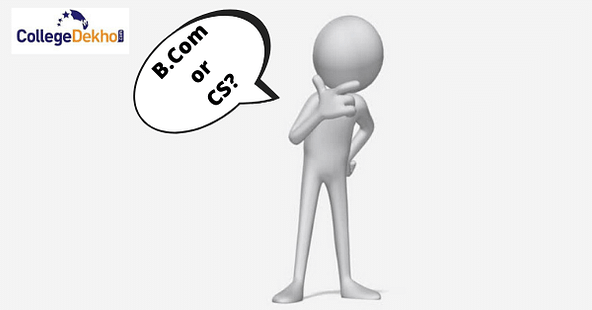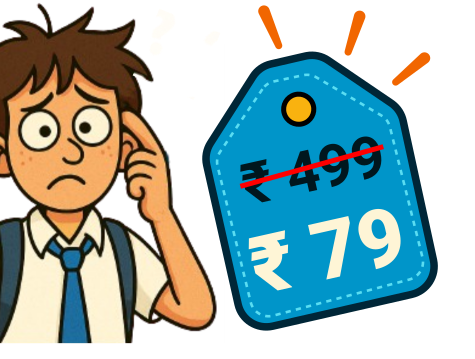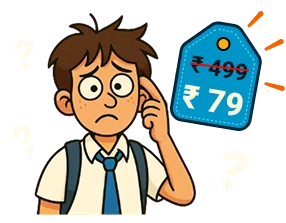It is very easy to find information in the era of the internet. But too much information tends to confuse a person. We have given below the adequate amount of information to help you find out the answer to ‘CS Vs B.Com’.

The demand for Banking, Commerce, and Finance courses is on the rise due to the rapidly evolving dynamics of these industries. B.Com (Bachelor of Commerce) and CS (Company Secretary) are examples of such courses that often leave students in a dilemma. If you are also pondering whether to pursue B.Com or CS after 12th, you're in luck. We have compiled a list of similarities and differences between these courses to help you find the answer to 'CS Vs B.Com - Which is better after Class 12?'
By examining these aspects, including duration, curriculum, pattern, syllabus, career prospects, and salary packages, you will be better equipped to make an informed decision about which path suits you best. It is crucial to thoroughly explore every aspect of both courses before choosing a career path. So, go ahead and compare B.Com and CS courses, and make your final decision with confidence.
About B.Com and CS Course
B.Com (Bachelor of Commerce) is an undergraduate degree that can be pursued by a student after completing class 12. But, CS (Company Secretary) on the other hand can neither be called an undergraduate degree nor a postgraduate. The course is completed in three different stages: Foundation, Executive, and Professional. All of these stages have different eligibility criteria and require different levels of higher education. Understanding how the CS course works are very important for an aspirant. So, here are the links that will help you comprehend its working and the comparison below.
Highlights on B.Com Vs CS
Before deciding which course to choose between B.Com and CS, let’s take a quick look at both courses.
Features | B.Com | CS |
|---|---|---|
Full Form | Bachelor of Commerce | Company Secretary |
Eligibility | 10+2 | 10+2/ 10+2+3 |
Flexibility of Duration | Fixed | Not Fixed |
Course Duration | 3 Years | 2.5 Years - 3.5 Years |
Course Type | Degree Programme | Certification |
Starting Salary | INR 2.5 LPA - INR 34 LPA | INR 3 LPA - INR 14 LPA |
Employment Opportunities | Auditor, Banker, HR, Accountant, Tax Consultant, Business Consultant, Financial Analyst, etc | Legal Advisor, Principal Secretary, Assistance to the Board of Directors, Corporate Policymaker, etc |
B.Com Vs CS: Eligibility
The comparison between the eligibility criteria of CS and B.Com is mentioned below in the table.
B.Com Eligibility Criteria |
|
|---|---|
CS Foundation Programme Eligibility Criteria |
|
CS Executive Programme Eligibility Criteria |
|
CS Professional Programme Eligibility Criteria |
|
B.Com Vs CS: Course Duration
Where the duration of the B.Com course is fixed i.e., three years, there is no fixed duration for the CS course as such. The time period for the completion of a CS course depends on a student’s caliber. Here is the comparison to make your concepts clear.
CS Programme | Minimum Duration | Maximum Duration |
|---|---|---|
Foundation Programme | 8 Months | 12 Months |
Executive Programme | 9 Months | 12 Months |
Professional Programme | 10 Months | 15 Months |
All in all, B.Com is completed in a course of three years in which the course is divided into six different semesters. But, the CS course can take from 2.5 years to 3.5 years.
B.Com Vs CS: Syllabus
The detailed syllabus of B.Com and CS are mentioned below:
- The syllabus of the CS Foundation Programme contains 4 papers, the Executive Programme consists of 8 papers and Professional Programme has 9 papers.
- The reason why B.Com graduates are not required to appear for the Foundation Programme is that the 4 papers covered in its syllabus are similar to that of B.Com.
- Some of the common topics in both courses are Business Law, Business Economics, Accounting, Business Management, Commercial Knowledge, etc.
B.Com | CS |
|---|---|
Accounts | Business Correspondence |
English | Essentials of Good English |
Economics | Common Business Terminology |
Maths/ Computer | Indian Contract Act and Law of Torts |
Environment & Public Health | Indian Constitution |
Business Communication | Company Law |
Computer Applications & IT | Company Secretaries Legislation |
Second Language | Legal Reasoning |
General Awareness I | Verbal Reasoning |
General Awareness II | Logical Reasoning |
Income Tax Laws | Non-Verbal Reasoning |
Banking & Insurance | Current Affairs |
Microeconomics I | Demand, Supply, and Forms of Competition |
Financial Markets & Institutions | Indian Union Budget |
Indian Economy | National Income Accounting and Related Budgets |
Corporate Accounting-I | Indian Union Budgets |
Business Communication | Business Environment |
Cost Accounting | Company Law |
Entrepreneurship | Jurisprudence, Interpretation and General Laws |
Marketing Management | Setting of Business Entities and their Closure |
Banking & Financial Systems | Corporate and Management Accounting |
Income Tax | Economic, Commercial and Business Laws |
Advance Accounting Paper-II | Financial and Strategic Management |
BCom Indirect Taxes Paper-II | Advanced Company Law and Practice |
Marketing Management | Secretarial Audit, Compliance Management, and Due Diligence |
Contemporary Indian Economic Issues & Policies | Information Technology and Systems Audit |
Mercantile Law-II | Financial, Treasury and Forex Management |
If you are appearing under the Rajasthan School board then you can check RBSE Class 12 Syllabus 2023-24 and RBSE 12th Time Table 2024 to start the preparation for the final exam.
B.Com Vs CS: Job Prospects
CS is a very lucrative career choice whereas, candidates who have studied B.Com can get various job opportunities across the country. Depending on the skills and work experience, the salary of candidates will eventually increase. Take a look at the various job prospects available for both B.Com and CS.
Job Opportunities of B.Com | Job Opportunities of CS |
|---|---|
Tax Consultant | Chief Administrative Officer |
Auditor | Corporate Planner |
Insurance Consultant | Business Consultant |
Stock Broker | Legal Advisor |
Accountant | Administrative Secretary |
Export-Import Manager | Corporate Policymaker |
Banker | Member of Board of Directors |
Finance Consultant | Managing Director |
Accounts Manager | Investment Banker |
Business Consultant | Revenue Manager |
B.Com Vs CS Colleges in India
Some of the top B.Com Colleges in India are listed below along with the colleges that are registered with ICSI and provide the CS course:
B.Com | CS |
|---|---|
The Institute of Company Secretaries of India (ICSI) | |
Indira Gandhi National Open University | |
- | |
- | |
- | |
St. Xaviers College | - |
- | |
- | |
- | |
- |
B.Com Vs CS: Salary
Depending upon the organisation and one's experience, the annual salary package after B.Com can vary from INR 2.5 LPA to INR 32 LPA.
The average monthly salary of a CS fresher can range from INR 25,000 to INR 35,000. With experience, the package increases and can go as high as INR 14 LPA or more.
Related Articles
Apart from this, many students get confused about whether to pursue CS after 12th or after B.Com. if you are also confused about the same, the above-mentioned comparisons would help you. But the major factor that you need to consider is time. To save themselves from investing 6 - 6.5 years in something that can be completed in 3 - 3.5 years, many students prefer pursuing CS after Class 12. But, if you are someone who wants to have an alternative, pursuing CS along with B.Com would be a better choice for you.
Hope you found your answer. In case of any doubt, feel free to head to our Q&AZone . For more such updates, stay tuned to CollegeDekho .
Are you feeling lost and unsure about what career path to take after completing 12th standard?
Say goodbye to confusion and hello to a bright future!

FAQs
A CS graduate can work as an Assistance to the Board of Directors, Company Secretary, Legal Advisor, Principal Secretary, Corporate Policymaker, Arbitration and Conciliation, Corporate Restructuring, Foreign Collaborations and Joint Ventures, Project Planning, etc. The top recruiters of CS candidates are KPMG, Deloitte, ONGC, HCL Technologies Ltd., Jaypee Group and Punjab National Bank.
As the CS course consist of 3 sections, the different subjects taught to the students are Business Communication, Legal Aptitude and Logical Reasoning, Current Affairs and Viva Voce (Viva Voce announcement yet to be done by ICSI), Economic and Business Environment, Business Correspondence, Business Communication, Essentials of Good English, Common Business Terminology, Indian Contract Act and Law of Torts, Indian Constitution, Company Law, Company Secretaries Legislation, Legal Reasoning, Verbal Reasoning, Logical Reasoning, Non-Verbal Reasoning, Listening Skills, Written Communication Skills, Demand, Supply, and Forms of Competition, Indian Union Budget, National Income Accounting and Related Budgets, Indian Union Budgets, Indian Economy, Business Environment, Company Law, Jurisprudence, Interpretation and General Laws, Setting of Business Entities and their Closure, Tax Laws and Regulations, Corporate and Management Accounting, etc.
In total, there are 3 Company Secretary programs within the ICSI Company Secretary curriculum, the Company Secretary Foundation, the Company Secretary Executive, and the Company Secretary Professional program. The Foundation course is the first step toward the journey of becoming a company secretary and the program lasts not more than eight months and comprises four papers which contain business environment and law, business economics, fundamentals of accounting and auditing, and business management, ethics, and entrepreneurship. Candidates can take admission into the Executive program after passing the CSEET examination. You can only take the CSEET (Company Secretary Executive Entrance Test) examination if you are appearing/ completed your Class 12th or equivalent examination from a recognized board. To take admission into the CS Professional program, candidates have to clear the Executive examination. The professional program lasts for 15 months after which all the candidates are mandatorily required to complete long-term internships with specified companies.
B.Com graduates have good career options available to them after completing their graduation. Some of the jobs available for B.Com graduates are Financial Analyst, Tax Consultant, Auditor, Banker, Business Consultant, Financial Analyst, Investment Banker, Human Resource, etc. Various sectors offer jobs to candidates who have completed their graduation in B.Com. Different sectors where B.Com graduates can find jobs are Finance, Accounts, Law, Taxation, Operations, Management, etc. Companies like Accenture, Capgemini, Wipro, Deloitte, Ernst & Young, Cognizant and more hire B.Com graduates.
You can take up B.Com if you have completed Class 12th preferably in Commerce Stream from a recognised board with at least 45% aggregate marks. The minimum percentage required for B.Com admissions depends upon the college in which candidates seek admission. Delhi University provides admissions to candidates in B.Com courses with a percentage of 95% to 99%, whereas some colleges grant admission to students who have a percentage range of 50% to 70%. Keep in mind that colleges give more preference to students who have completed their Class XII in Commerce stream. You might have to appear for entrance exams as some colleges conduct entrance examinations for the B.Com course.
Candidates opt for Company Secretary (CS) because it’s a highly rewarding profession with a plethora of job opportunities and excellent career growth along with a high-paying salary. As a CS, you will be directly working with the senior management of a company, and your job duties and commitments would be to handle tax returns, ensure compensations are paid off on time to the shareholders and manage financial and other legal regulations. Candidates having excellent legal skills, solid communication skills, good critical thinking, and problem-solving skills must study CS.
If you are interested in making a career in the management field, banking sector and commerce field then you should definitely opt for the B.Com course. B.Com offers lucrative career choices and if you want to join top companies or want to start your own business, then choose B.Com after your 10+2. Some of the exciting jobs that you can do after graduation are Bankers, Insurance Advisors, Auditors, Accountants, Financial Advisors, etc. You can also do M.Com or study CA or do MBA after your graduation.
The B.Com course is offered to the students for a duration of 3 years that can be pursued right after completing Class 12. The important subjects that are taught to the students are Human Resources, Business Law, Decision Analysis, Economics, Logistics Management, Labour Relations, Industrial Psychology, Management Science, Accounting, Marketing, Politics & Public Policy, Econometrics, Auditing, Taxation, Insurance, Banking, Transport Economics, Communication, Computer Applications & IT, Entrepreneurship and many more.
The CS course is divided into 3 sections, the Company Secretary foundation, the Company Secretary executive, and the Company Secretary professional course. For the Company Secretary foundation, candidates must have passed a 10+2 or equivalent examination from a recognized board however, aspirants from Arts, Commerce and Science streams are considered eligible while Fine Arts students are not allowed for the programme. For the Company Secretary executive program, candidates must be 17 years of age and above with a Bachelor’s degree from a recognised university. Graduates from all streams except Fine Arts are not considered eligible. The Company Secretary professional course can only be pursued by those candidates who have cleared the Executive Programme.
Was this article helpful?




















Similar Articles
Know the Difference Between B.Com and B.Com (Hons.)
Maharashtra B.Com Admission 2025: Dates, Application Procedure, Fees, Selection
Best Courses after 12th for Commerce Students
Top B.Com Colleges Accepting CUET 2025 Score in India: Fees, Eligibility, Admission Process
Top 10 Economics Colleges in Delhi University
Shri Ram College of Commerce (SRCC) CUET Cutoff 2025: Expected Cutoff based on Previous Trends